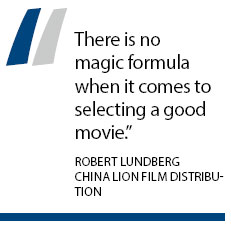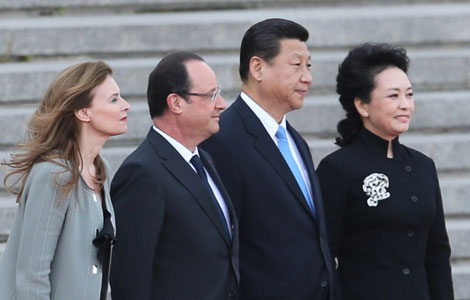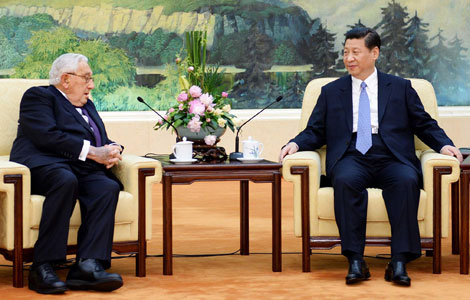Waiting for the next Ang Lee
Updated: 2013-04-26 10:56
By Zhang Qidong (China Daily)
|
||||||||
|
Film director Chen Daming is shown shooting a scene in 2010 from his re-make of "What Women Want," starring Andy Lau and Gong Li. Provided to China Daily |
Film directors in China want success in the US, but they haven't figured out how to transmit universal values into an American context, reports Zhang Qidong from San Francisco.
Who wants to be the next Ang Lee? Every film director in China does. But Chinese directors are finding their dreams of creating another Hollywood blockbuster a mission impossible, at least for now.
Lost in Thailand was a major box-office hit in China, grossing $200 million last year. When the film came to the attention of the senior staff of AMC Theaters, which was acquired last June by Chinese mogul Wang Jianlin, the movie was acquired by AMC for distribution in the US in January. It grossed $57,000.
China hosted 118 Chinese film festivals in more than 40 countries last year, where more than 614 movies were screened and 55 of them won 73 international awards, according to Xiao Xiayong, the culture counselor of Chinese Consulate General in San Francisco. But success at the box office has been another matter.
The Chinese State Administration of Radio, Film and Television reported total global revenue of 10 billion yuan ($166 million) for Chinese movies in 2012. That's less than the Chinese box-office receipts for one foreign movie - Avatar which grossed $182 million in China, according to Box Office Mojo.
Alex Zhijie Jia, a film producer and script doctor working in Beijing, attributes the subpar box-office results outside of China to the newness of the Chinese movie industry, and Chinese directors not yet figuring out how to transmit universal values from Chinese culture into an American context.
"The US and China have had a relationship for less than three decades," he said. "We would love to embrace the world, but it will take time for us to know how and what when it comes to universal values. Many of our directors are promoting Chinese values while Americans are promoting universal values."
Younger Chinese directors have tackled the US market in recent years. Chen Daming is one of them.
'Universal success'
Chen, who spent nine years in Hollywood acting, directing and producing in the early 1990s, is determined to make movies for audiences in US and China. With three co-production projects in the pipeline, he prides himself on pioneering "universal success."
He wrote and directed Manhole (2004), One Foot Off the Ground (2006), nominated for the Golden Rooster Chinese National Award for Best Picture, Best Original Screenplay, Best Actor and Best Actress), and What Women Want (2011, a remake of Mel Gibson's movie). According to Chen, it's a challenge to make films that can cross cultures and achieve box-office success across continents.
"Our directors are not able to make movies targeted for foreign markets like Hollywood directors," said Chen. "Storytelling is also our weakness. Our hero might not be seen as a hero in a Westerners' heart. We need to learn how to tell our story right."
He said many directors in China have given up making movies that target international or US markets because the domestic market is presenting lucrative box-office revenue. "It's too difficult to take a risk on the 'universal value' that assures an overseas box-office success," he said.
Jia also notes the lack of universal appeal in Chinese movies.

"You wonder why Hollywood keeps changing the bottles, but not the wine, as the Chinese saying goes," he said. "Hollywood will probably tell you that is the secret recipe of storytelling and of their success. The Kung Fu Panda story is neither American nor Chinese, but universal, and its universal appeal is reflected in the worldwide box- office success."
"Although our agony today is that Kung Fu Panda is not 'made in China', we need to realize that Kungfu and panda are only superficial tools that make the story appear different and unique for American producers," he said. "Deep down, it's the same old story about the maturation of a hero through a challenging and sometime life-threatening journey, a core of many other great stories. "
Ji said he believes that for Chinese filmmakers who are interested in reaching a worldwide audience, understanding universal values, story traditions and the audience are the first steps in the right direction.
Jia provided an example of a recent attempt to enter the US market by director Chen Kaige, who, along with Zhang Yimou, were the first to bring Chinese movies to American audiences on a large scale in the early 1990s. Known as Fifth Generation Directors (born in the 1950s), both are household names in China.
Westernized techniques
"Chen utilizes very Westernized techniques to produce his movies. 'The Promise' ($669,000, 2006) tells a story of a man who sacrifices his own son to save his savior's son. The story sounds sacred, but it is not possible for Western audiences to accept it. Universal value should be simple, across cultures, across territories and countries," said Jia.
The central works of Zhang - Raise the Red Lantern ($2.6 million, 1991), Ju Dou ($1.9 million, 1991) and the Story of Qiu Ju ($1.8 million, 1993) - captivated US audiences with his cinematography skills and gripping stories of the lives of Chinese women. Hero, released in 2004, grossed $53.7 million, a box-office record for a Chinese movie in the US.
"Every shot of Zhang's movie is like a piece of art," said Stanley Rosen, a professor of political science at the University of Southern California and a Chinese film expert. "He is also a superb story teller when it comes to women."
Together with Zhang, Chen Kaige's Farewell My Concubine ($5.2 million, 1993), a movie about two stars in a Peking opera troupe and the woman who comes between them, explored the effects of political turmoil during the mid 20th-century on the lives of individuals and families in China.
Doris Pfardrescher, president of Well Go USA Entertainment, said she was "obsessed" with Zhang's movies in the early 1990s when she was a college student.
Well Go, based in Plano, Texas, began by distributing Asian martial art films to small American video stores in the early 1990s. Pfardrescher's company has watched the trend of Chinese movies coming to the US for the past two decades. The company now has 85 percent of the US home-video market for Chinese movies, and sells to major retailers such as Wal-Mart Stores Inc, Target Corp, Kmart, and Best Buy Co. Pfardrescher said major growth of the Chinese home-video market in the US didn't occur until 2009. The best-sellers on her list are still martial-art movies.
Action movies
"Chinese comedies don't do well, especially drama, due to cultural differences," she said. "The story-telling is also difficult for American audiences to understand. Action movies, however, are different; the spirit is simpler and is much easier to reach the audience."
China Lion Film Distribution, based in Los Angeles and run by President Jiang Yanming, is by far the largest Chinese movie distributor in the US, releasing at least 10 to 15 films to AMC theaters per year since its establishment in 2010. The company also has distribution agreements with a number of China's leading producers, including Huayi Bros, Shanghai Film Group and PolyBona in Beijing.
"Our task is to make good Chinese films available in the US so that American audiences know that if they want to see a Chinese movie, they will have a chance to access it," said Robert Lundberg, senior vice-president of marketing at China Lion.
A graduate of Purdue University in Lafayette, Indiana, where he was a film major, Lundberg quit his job at Universal Studios to join China Lion when it started.
"It's such an interesting period in Chinese film production as well as distribution, and I want to be part of its evolving period," he said. "We definitely will see more movies, better directors, actors and actresses coming out of China. It has been a learning period for the company to find the right movies and get them to the screen, and the same for American audiences to learn about what is being shown in the theaters."
China Lion mainly targets the Chinese-American market in the US, and it finds the time difference between US and Chinese film releases a challenge.
"We have about four to six weeks to market the films in the US after their release in China," Lundberg said. "If we get six weeks we are lucky. By the time we release the film in the US, however, many people already saw it online, or at home on DVD. Piracy is a big issue for us to achieve quality box office here."
AMC Theatres has been releasing Chinese movies monthly because of China Lion and now has launched its own effort.
According to Nikkole Denson-Randolph, vice-president of special and alternative content at AMC Theatres, AMC has seen a steady increase in the number of Mandarin-language films that have opened in the last three to four years. The stand-out films, according to her, tend to be romantic dramas, such as, If you are the one 2, ($426,000,2010) and Love ($309,000, 2012).
Jonathan de la Luz of Luzworks, a multi-media entertainment company in Austin, Texas, that produces content for film, television and Internet production, said the nature of traditional cinematic storytelling is changing to accommodate an audience's ability to interact with the storyteller.
"Movie distribution is about content management in today's market, that is, managing the monetization of movie content over the course of many available digital platforms from theater screens to iPads and everything in-between," Luz said.
'Free premium'
He predicts many movies will become free to watch in movie theaters within five to 10 years, presented under a freemium ("free premium") business model by which a core product is free and revenue is generated by selling premium products to a small percentage of the free users.
Well aware of the active co-production market between the US and China, Luz said he is keeping his eyes open for interesting scripts targeting the Chinese market, or opportunities to re-direct Chinese movies to the US market.
The importance of Chinese movie selection for the US market is emphasized by Well Go USA Entertainment, China Lion Film Distribution and AMC Theatres.
"There is no magic formula when it comes to selecting a good movie," said Lundberg of China Lion. "The so called 'Hollywood standard' is a movie well-acted, well-shot, with a quality story told. Universal value, romantic stories in China and US are very similar across the language and culture."
Pfardrescher of Well Go USA Entertainment said her movie-selection tricks include attending all international festivals, making picks of award-winning movies, and most of all, getting to meet with Chinese directors and establishing relationships.
AMC Theatres also shifted its traditional sourcing of Chinese movies from contracting exclusively with distributors, to open more opportunities.
"It's a period the Chinese movie industry has to experience," said Daming. "When our directors and producers face intense competition, and after our audience is sick of not-so-good movies, they will want better movies, and the industry will come up with good movies, or better movies."
Rosen, however, is pessimistic about Chinese movies succeeding in the US.
"Any director who intends to reach success outside of a country's culture will have limitations, especially if he intends to compete with Hollywood," he said. "Although today's Hollywood is more dependent on international market such as China, its global dominance and universal appeal has not been challenged so far."
"Subtitle, cultural barrier, storytelling and value transmission are major obstacles preventing a Chinese movie from box-office achievement in the US. Each one of the obstacles is hard to overcome, and today most of the Chinese directors still don't have a clue about how Hollywood doctrines work and do not understand US market elements."
Xiao Xiayong, the Chinese culture counselor in San Francisco, believes Chinese movies face the same challenges in the US market as other foreign movies, such as French or German.
"When you want to produce movies for the US market, you have to squeeze your brains in a McDonald's or Kentucky Fried Chicken way of thinking. I believe our directors are aware of the existing problem, but this is something we cannot rush - it will not happen overnight," said Xiao.
"Everyone is trying to give prescriptions to the Chinese directors when it comes to box office. Yet, it's a hard one. Mine is: give it time."
Contact the writer at kellyzhang@chinadailyusa.com
Most Viewed
Editor's Picks

|

|

|

|

|

|
Today's Top News
Phone bookings for taxis in Beijing
Chinese consumers push US exports higher
Seoul delivers ultimatum to DPRK
Boston bombing suspects intended to attack NYC
No let up in home price rises
Bird-watchers undaunted by H7N9 virus
Onset of flood season adds to quake zone risks
Vice-president Li meets US diplomat
US Weekly

|

|















